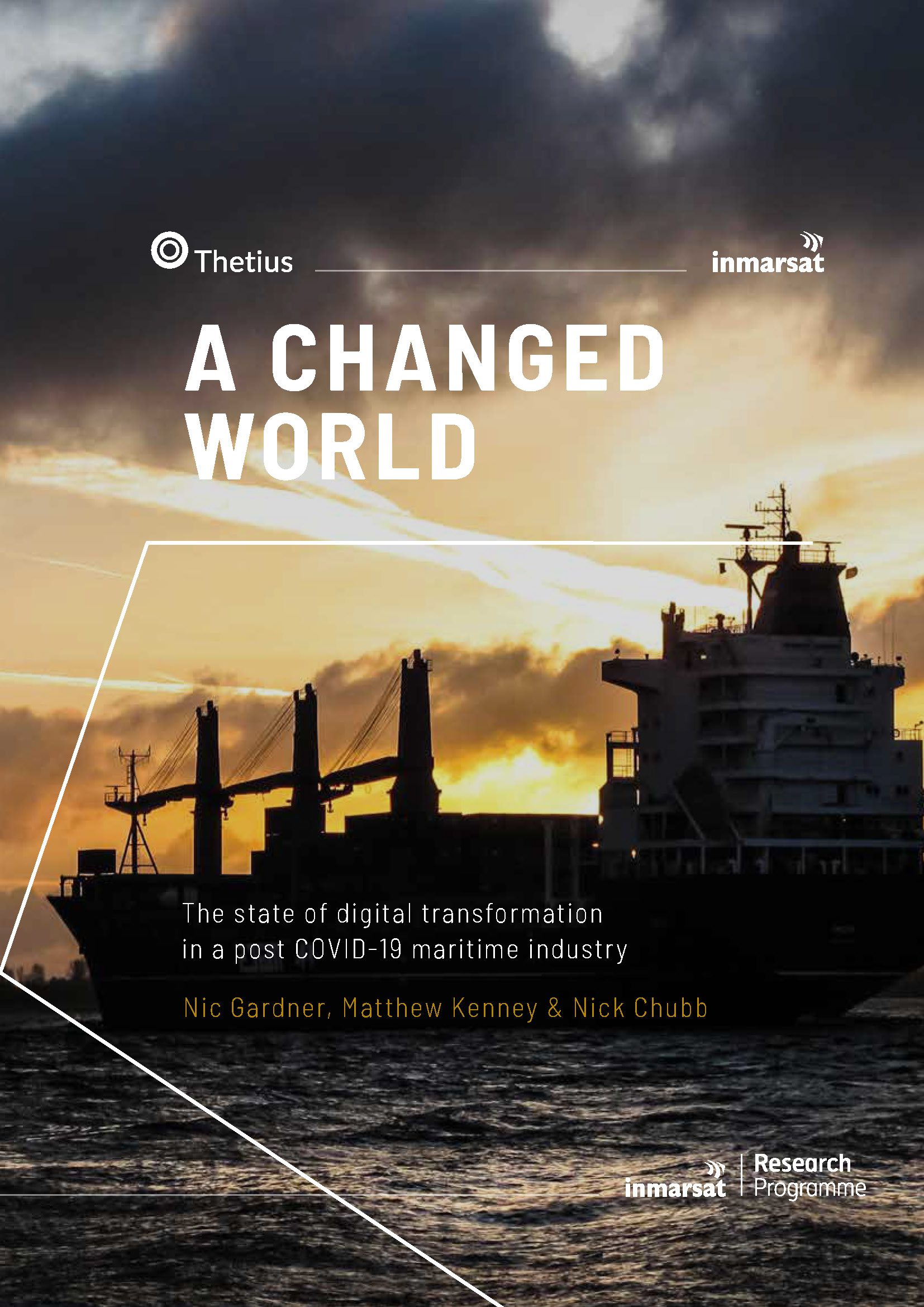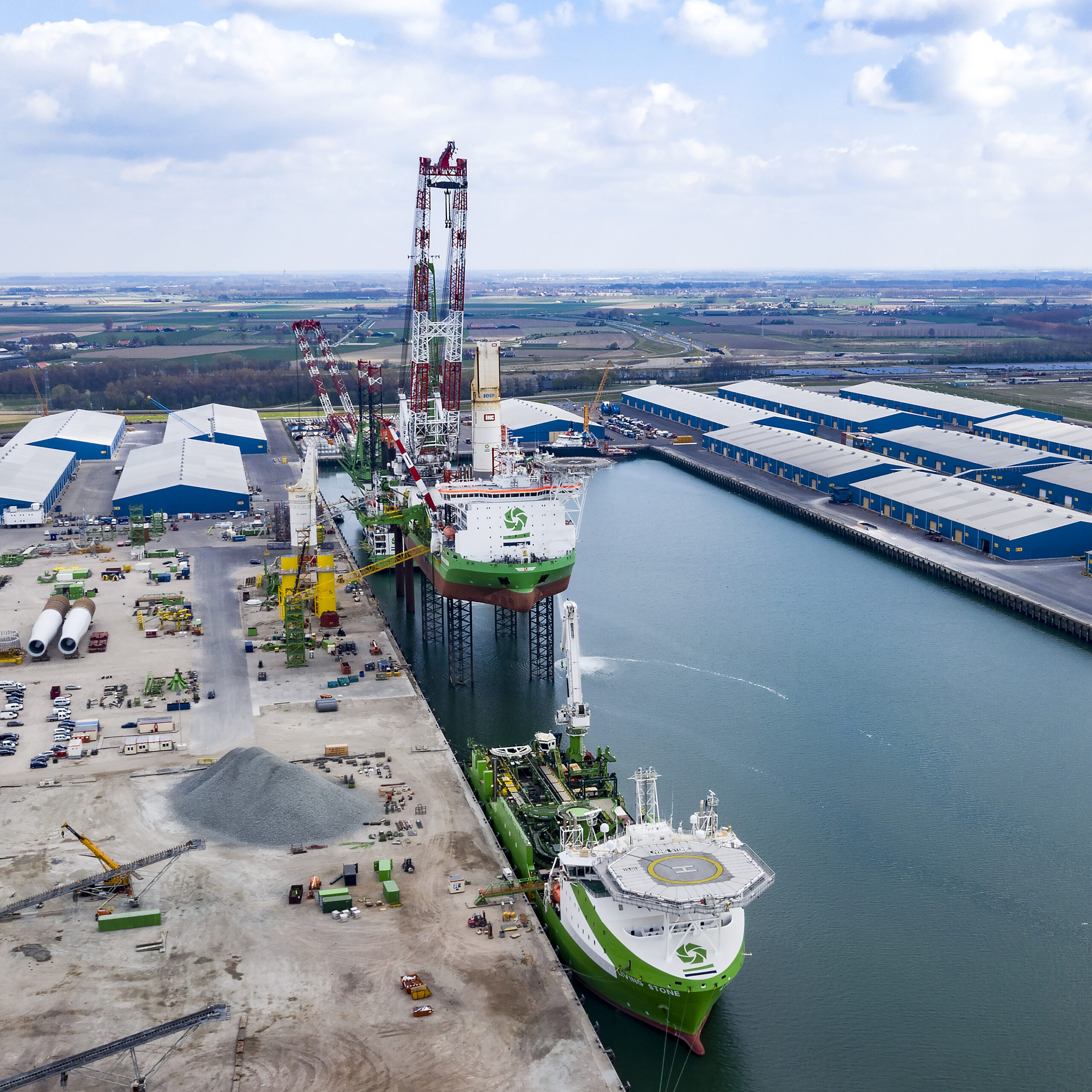Press Release – Inmarsat, the world leader in global, mobile satellite communications, has published a new report pinpointing the impact of COVID-19 in accelerating global shipping’s digital journey.
Written by maritime innovation consultancy Thetius and sponsored by the Inmarsat Research Programme, ‘A Changed World: The state of digital transformation in a post-COVID-19 maritime industry’ captures a sector fast-tracking IoT-based solutions from November 2019*. It characterises COVID-19 as a “universal disruptor and catalyst for digital transformation”.
The report finds that, as COVID-19 emerged and global travel restrictions took hold, surging demand for crew connectivity was echoed in uptake for other digital services needed to keep ships running.
“The impact of COVID-19 on ship operations is evidenced by a massive increase in the use of remote services such as pilotage and surveying,” the report says. “Similarly, crew training and officer examinations went fully online for the first time ever in some jurisdictions. More broadly, global trade facilitation saw an explosion in the use of digital tools, including massive growth in consumer demand for e-commerce and the use of online booking platforms for shipping freight.”
Inmarsat’s own data covering commercial shipping during the pandemic period showed that the average daily data consumption per vessel nearly tripled, from 3.4 to 9.8 gigabytes between January 2020 and March 2021. In a further significant shift, the authors project the global maritime digital products and services market in 2021 as being worth $159bn – 18% ahead of pre-pandemic forecasts. Thetius predicts that, by 2022, market turnover will be three years ahead of pre-pandemic forecasts.
“Digital solutions are now pervasive in maritime, and one consequence of COVID-19 has been that our customers – and their customers – increasingly think digital first,” commented Stefano Poli, VP Business Development, Inmarsat Maritime. “The last 18 months have been challenging, but they have also brought a seismic shift in attitudes in favour of IoT-based solutions for crew connectivity, safety, sustainability and ship efficiency. New acceptance of remote ship surveys, for example, led Inmarsat and Lloyd’s Register to collaborate on the first dedicated connectivity agreement to livestream surveys while vessels are at sea. This is just one example of the vast scope of previously promising digital opportunities whose maritime moment has come.
“Inmarsat recently unveiled plans for ORCHESTRA, the communications network of the future which will continue to anticipate digital needs,” Poli added. “Bringing together Inmarsat’s comprehensive geosynchronous (GEO) satellite network with low earth orbit satellites (LEO) and terrestrial 5G into a single high-performance ‘network of networks’, ORCHESTRA will deliver future-proof connectivity everywhere – including to hot spots in busy ports, passenger ships and autonomous vessels,“ he said.
As the world leader in global mobile satellite communications, Inmarsat is also headquartered in London, and the new report also focuses on the UK as a host nation for technology and innovation. Data from the Thetius intelligence platform shows that, since 2008, the UK has produced the highest number of maritime technology businesses in the G7 connected to ship operations and management. The UK is also second only to the United States as the most abundant source of cloud computing, data and analytics, and artificial intelligence (AI) technologies for the maritime sector.
A call for the UK Government to boost non-financial support for innovation in the maritime sector is one of three key recommendations in A Changed World. Thetius also suggests digital momentum will be best maintained globally if larger industry stakeholders create a route to decarbonisation with definite milestones, while start-ups would benefit from deeper understanding of the dynamics between different stakeholders in shipping to identify where their solutions can best be utilised.
About Inmarsat
Inmarsat is the world leader in global, mobile satellite communications. It owns and operates the world’s most diverse global portfolio of mobile telecommunications satellite networks, and holds a multi-layered, global spectrum portfolio, covering L-band, Ka-band and S-band, enabling unparalleled breadth and diversity in the solutions it provides. Inmarsat’s long-established global distribution network includes not only the world’s leading channel partners but also its own strong direct retail capabilities, enabling end to end customer service assurance.
The company has an unrivalled track record of operating the world’s most reliable global mobile satellite telecommunications networks, sustaining business and mission critical safety & operational applications for more than 40 years. It is also a major driving force behind technological innovation in mobile satellite communications, sustaining its leadership through a substantial investment and a powerful network of technology and manufacturing partners.
Inmarsat operates across a diversified portfolio of sectors with the financial resources to fund its business strategy and holds leading positions in the Maritime, Government, Aviation and Enterprise satcoms markets, operating consistently as a trusted, responsive and high-quality partner to its customers across the globe.
For further information, follow us: Twitter | LinkedIn | Facebook | YouTube | Instagram.
Unlock Exclusive Insights Today!
Join the gCaptain Club for curated content, insider opinions, and vibrant community discussions.

 Join The Club
Join The Club













